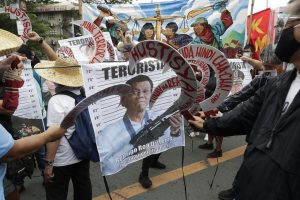At the onset, Rodrigo Duterte pegged himself as a wild card thrown into a deck of traditional politicians vying for the Philippine presidency. His emergence in the 2016 electoral race, however, revealed him to be more of a loose cannon, trigger happy and firing (quite literally) on all fronts. He always claimed that it was all rooted in his deep love for the nation. No doubt a large section of the public was endeared.
At the time, the Philippines was on the back end of a largely frustrating tenure by President Benigno “Noynoy” Aquino, whose liberal inclinations, soft power focus, and overall impotent administration perfectly set up any potential successor to stake a claim with a more action-oriented platform. There was a sense that anything was better than the status quo.
Like most populists, Duterte fit the bill. He was a man who capitalized, better than any of the other candidates, on the sentiment that something drastic had to be done. His highly questionable human rights record and past as a political turncoat didn’t much come into play during the campaign. With much fanfare, Duterte won the election.
His initial promises during the campaign and the start of his term – ending labor contractualization, defending Philippine borders from Chinese incursions, an independent foreign policy, peace with the communist insurrection, and a swift end to the corrupt bureaucracy – were welcomed by and large.
Duterte’s supporters often point to the fact that more than 16 million voters got behind the strongman in 2016. But five years later, what sustains Duterte’s popularity is his bravado. Everything else has more or less spectacularly collapsed.
Practically the only major promise intact from Duterte’s rise to power has been the bloody war on drugs. Duterte has unapologetically called for the genocide of drug users and dealers. While he has delivered on half that promise, much to the dismay of his victims, he has been suspiciously lenient on the cartels.
The blood-stained hands of the regime seem to be the most consistent feature of the last five years. Iron-fisted force, unseen since the martial law period under former dictator Ferdinand Marcos, has had a hand in almost all major political developments. From the arrests of opposition members, the brutal crackdown on activists, and the muscling-up of law enforcement, the last half-decade has been a violent and frightful period for many. What people wanted was for peace and stability to be wrangled from the red-tape ensnared Aquino administration; Duterte delivered something unimaginably worse.
As the country continues to grapple with the pandemic, propelling the population into a downward economic and public health spiral, the worst qualities of the current government – an inability to solve its problems without shooting at something – have been further laid bare.

































